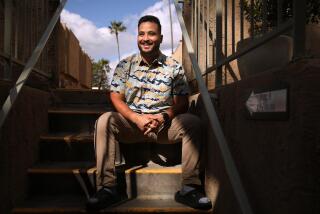Gambling Down Under: Over the Top
- Share via
SYDNEY, Australia — When Australia’s richest man, Kerry Packer, shelled out nearly a million dollars in cash to pay off racetrack bookies some years ago, he shrugged off the losses. “I, like many other Australians, like to bet,” said the media baron.
Packer, with an estimated personal fortune of about $2 billion, is known from Caesars Palace in Las Vegas to the Ritz in London as one of the world’s biggest high-rolling casino gamblers.
He isn’t the only one in Australia with an almost obsessive love of gambling. According to an assessment of spending patterns, Australians are the Western world’s biggest gamblers, spending more per capita on betting than on food.
The nation’s 18.5 million people gamble the equivalent of more than $40 billion a year at racetracks and casinos, on lottery tickets and in card machines at local clubs and bars--more than $2,000 for every man, woman and child.
Americans are not that far behind. According to the U.S. Gambling Commission, gambling is a $500 billion-a-year industry in the United States. With a population of about 267 million, that’s more than $1,800 each.
Those figures, of course, don’t take into account bets between individuals over a handshake.
“I bet on the horses, sometimes the pokies [card machines] when I’m bored and occasionally at the casino,” said one 29-year-old gambler, who didn’t want to be quoted by name. “I spend maybe 400, 500 [Australian] dollars a year [$270-$330]. But I’m in control of it.”
Others are not. A proliferation of new gambling outlets is accompanied by increasing social costs, church and welfare agencies say.
Alex Blaszczynski, an associate professor at the Impulse Control Disorders Unit at Liverpool Hospital in Sydney, said 90% of Australians gamble in some fashion. At least 200,000 of those are “problem gamblers,” betting more than they can afford to lose, he said.
Among the social problems:
* Bankruptcies attributed to gambling are growing at twice the rate of those from other causes.
* Judges are noting increasing theft cases blamed on gambling.
* Welfare agencies say gambling addicts are losing home and family. Some are committing suicide.
* The number of people seeking treatment for gambling addiction has quintupled in New South Wales, the nation’s most populous state, in the last three years.
Australians can make telephone bets on most sports, play poker machines in corner clubs and bars and, increasingly, gamble via the Internet. Bets are even taken on national elections.
There are 14 casinos around the nation, enough to saturate the market. Indeed, the future of at least two is seriously in doubt--in the northern tourist city of Cairns and on remote Christmas Island.
Despite that, new casinos continue to open. When the $780-million Star City casino opened in Sydney in November, it closed a circle: Every major city in Australia now has a casino.
Competition for the gambling dollar is strong. Casinos fly in high rollers aboard private jets and put on Broadway-style shows. Suburban clubs offer free meals and drinks and install automatic teller machines near the rows and rows of gambling machines. Race betting shops offer free cappuccino.
Counselors say state governments are turning a blind eye to the social costs because they have their own form of gambling addiction--to the taxes on gambling receipts.
“The government is a major problem gambler because they’re relying on gambling to fund their deficit,” said Jim Connolly, a Sydney gambling-addiction counselor.
In the 12-month period through last June, gambling taxes provided the Labor Party government of New South Wales with $780 million--more than 10% of its total revenue. In 1994-95, all states took in almost $2 billion from gambling.
In Victoria, conservative state Premier Jeff Kennett encouraged elderly people to play gambling machines as a social activity, despite figures showing that some were gambling away life savings.
Not only individuals can lose in this high-stakes business.
In December, Melbourne’s Crown Casino reported a loss of $26 million in five months. Casino boss Lloyd Williams blamed a $35.7-million winning streak by Asian high rollers, which required shareholders to put in $95 million more to bail out the $1.3-billion hotel, cinema and shopping complex.
Williams, however, says he’s confident his casino’s fortunes will turn around.
That means the bettors will have to become losers again.
More to Read
Sign up for Essential California
The most important California stories and recommendations in your inbox every morning.
You may occasionally receive promotional content from the Los Angeles Times.










